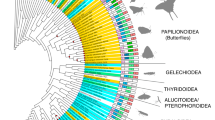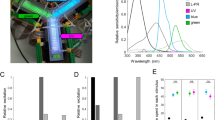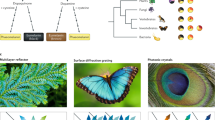Abstract
BELIEVING that light can be thrown on some of the problems of evolution by an experimental investigation of the development of melanism in lepidoptera, we have been studying the influence of the food plants growing in critical areas, and also of inorganic substances likely to occur in or on the plants of such regions, on races of moths imported from non-melanic districts. Our cultures have been reared at two centres; some at Birtley (Durham), an area producing a very large number of melanic species, and others at Hexham (Northumberland), where melanism is much less prevalent, although not absent. The work is not finished, but certain facts seem worth publishing at once, particularly in view of the recent controversy as to the value of Kammerer's experiments.
This is a preview of subscription content, access via your institution
Access options
Subscribe to this journal
Receive 51 print issues and online access
$199.00 per year
only $3.90 per issue
Buy this article
- Purchase on Springer Link
- Instant access to full article PDF
Prices may be subject to local taxes which are calculated during checkout
Similar content being viewed by others
Author information
Authors and Affiliations
Rights and permissions
About this article
Cite this article
GARRETT, F., HARRISON, J. Melanism in the Lepidoptera and its Possible Induction. Nature 112, 240–241 (1923). https://doi.org/10.1038/112240c0
Issue Date:
DOI: https://doi.org/10.1038/112240c0
Comments
By submitting a comment you agree to abide by our Terms and Community Guidelines. If you find something abusive or that does not comply with our terms or guidelines please flag it as inappropriate.



